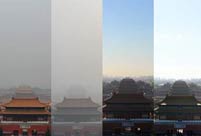BEIJING, Nov. 14 -- The role of the market in China has officially switched from "basic" to "decisive", and is key to understanding the reform agenda.
Tuesday's communique after the Third Plenary Session of the 18th Communist Party of China (CPC) Central Committee stressed profound economic reform, with the market to play the decisive role in allocation of resources.
The previous socialist market economy -- official policy since 1992 -- attributed only a "basic" role to the market.
The semantic signal applies to a range of sectors, including energy, finance, land and services, and is intended to invigorate businesses.
Zhang Liqun, an analyst with the Development Research Center of the State Council, said the previous "basic" role of the market did not exclude anything which might have been involved in the flow of production factors and allocation of resources.
"Tuesday's communique suggests the role of the market in Chinese economy will be enhanced," he said.
A prerequisite to allowing supply and demand to allocate resources is an open, unified market with orderly competition, according to the communique. Market barriers must be removed, and regional protectionism and local government intervention will be curtailed. Prices of production factors such as capital, energy and foreign exchange will also be decided by the market, Zhang said.
Echoing Zhang, Qu Hongbin, HSBC chief China economist, believes that mechanisms for energy prices, exchange rates, interest rates, land prices and the price of services may all be about to change.
Specific details are as yet not forthcoming, but a unified market for both urban and rural construction land and an improved financial system are definitely in the pipeline. The central work team announced on Tuesday will steer the reform in a coordinated way and tackle headwinds, Qu said.
As for state-owned enterprises (SOEs), an area underplayed in the communique, an easier environment for private business will help nudge big SOEs out of their comfort zone, analysts suggest.
The communique, which sees both public and private sectors as important components of a socialist market economy, has promised that private enterprise will be "encouraged, supported, and guided."
Peng Wensheng of China International Capital Corporation believes that the emphasis on the market and competition suggests SOEs will be operating in an improved market environment and he expects further steps to break up state monopolies and modernize SOEs.
Lin Caiyi of Guotai Junan Securities also expects easing of market access for private investors, with state monopolies in telecommunications and the financial sector being the first to go.
Market reorienting is already underway. In July, the central bank canceled the floor on lending rates and the China (Shanghai) Pilot Free Trade Zone was launched in September.
In parallel to the role of the market, the communique also made it clear that there was room for improvement in how the government does its job, stating openly that the core of economic reform is the relationship between government and market.
Zhang Zhuoyuan, an economist and member of the Chinese Academy of Social Sciences (CASS), noted that stress on market doesn't automatically mean less of a role for government. "It means government functions should be played out in a proper and better way."
Better government direction in macro-control, regulation, public services and social governance are crucial for a socialist market economy and healthy economic development, said the CASS economist.
The central leadership has been working on administrative reform, cutting red tape and decentralizing power, abolishing more than 200 administrative procedures or transferring them to local governments.
In late October, the State Council streamlined the corporate registration system to open the market and mobilize social resources, a concrete step to improve the business environment.
 Luxury-cars parade held in Dubai
Luxury-cars parade held in Dubai Special forces take tough training sessions
Special forces take tough training sessions Fire guts 22-storey Nigeria commercial building in Lagos
Fire guts 22-storey Nigeria commercial building in Lagos A girl takes care of paralyzed father for 10 years
A girl takes care of paralyzed father for 10 years A record of Beijing air quality change
A record of Beijing air quality change In pictures: explosions occur in Taiyuan
In pictures: explosions occur in Taiyuan Live a harmonious life in Pu'er, SW China
Live a harmonious life in Pu'er, SW China Weekly Sports Photos
Weekly Sports Photos Gingko leaves turn brilliant golden yellow in Beijing
Gingko leaves turn brilliant golden yellow in Beijing Maritime counter-terrorism drill
Maritime counter-terrorism drill Loyal dog waits for master for six months
Loyal dog waits for master for six months Living in an urban village: 'Iron-digger' Xiong Sansan
Living in an urban village: 'Iron-digger' Xiong Sansan China in autumn: Kingdom of red and golden
China in autumn: Kingdom of red and golden National Geographic Traveler Photo Contest
National Geographic Traveler Photo Contest Weekly Sports Photos
Weekly Sports PhotosDay|Week|Month